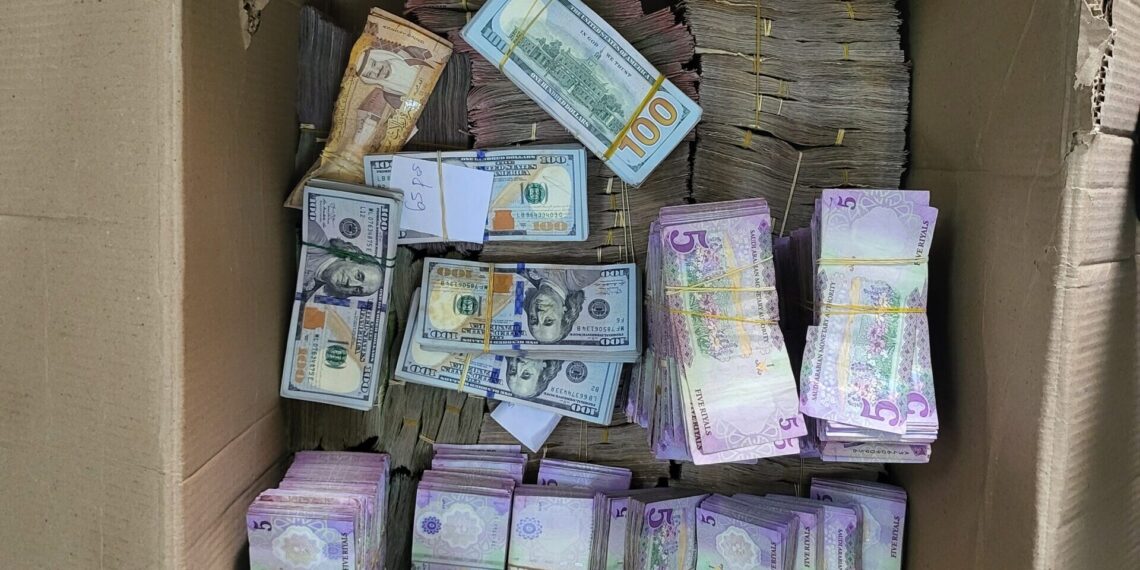
EFCC Closes In: Multi-Million Dollar and Riyal Cash Haul at Kano Airport Sparks Legal Storm
In a stunning revelation that has captured national attention, the Economic and Financial Crimes Commission (EFCC) has announced its intention to press charges against individuals linked to a staggering seizure of foreign currencies at the Malam Aminu Kano International Airport. The intercepted funds, totaling $86,500 and 305,150 Saudi Riyals, have
In a stunning revelation that has captured national attention, the Economic and Financial Crimes Commission (EFCC) has announced its intention to press charges against individuals linked to a staggering seizure of foreign currencies at the Malam Aminu Kano International Airport. The intercepted funds, totaling $86,500 and 305,150 Saudi Riyals, have raised serious suspicions of money laundering and other financial crimes, igniting a fresh wave of scrutiny over Nigeria’s air travel corridors and financial integrity.
According to EFCC officials, the foreign currencies were uncovered in suspicious circumstances during a routine security check by operatives stationed at the Kano Airport. The EFCC has remained tight-lipped about the identities of the suspects at the center of this case but confirmed that a detailed investigation is already underway, with formal charges expected to follow swiftly. The agency is treating the matter with the utmost urgency, citing its potential links to international money laundering syndicates and financial crimes that could have far-reaching implications for national security.
Eyewitnesses at the airport reported heightened security presence around the time of the seizure, with EFCC operatives collaborating with customs and aviation security to isolate the suspects and secure the money. While full details have not been released, sources within the commission suggest that the suspects may have attempted to transport the funds without proper documentation or declaration, a serious offense under both Nigerian and international financial regulations.
In its official statement, the EFCC reiterated its commitment to fighting illicit financial flows, describing the interception as a major breakthrough in its ongoing efforts to combat economic crimes. The commission emphasized that Nigeria cannot afford to be a transit or storage hub for illicit funds, especially at a time when the country is grappling with economic challenges and a currency crisis that has made foreign exchange a highly sensitive subject.
The sheer volume and nature of the intercepted funds have triggered questions about the destination and purpose of the money. Analysts believe that the 305,150 Saudi Riyals, in particular, may suggest attempts to smuggle cash out of the country under the guise of Hajj or Umrah travel, which has historically been exploited by smuggling rings. Others suspect the involvement of corrupt government officials or politically exposed persons attempting to launder proceeds of illicit deals.
Legal experts have weighed in on the development, noting that the suspects could face multiple charges under the Money Laundering (Prohibition) Act, the Economic and Financial Crimes Commission Act, and potentially the Terrorism (Prevention) Act if any link is found to financing unlawful activities. Convictions under these laws carry severe penalties, including lengthy prison sentences, asset forfeiture, and international travel restrictions.
Beyond the legal consequences for the individuals involved, this incident has reignited public debate about the effectiveness of Nigeria’s anti-corruption framework and the persistent loopholes in airport surveillance. Many citizens took to social media to express their concerns, praising the EFCC for the interception while also calling for greater transparency in the prosecution process. Civil society organizations are also demanding that the investigation go beyond the couriers to identify the real masterminds behind the money movement, warning that scapegoating low-level actors will do little to deter future crimes.
The Kano Airport interception also comes at a time when Nigeria is under intense pressure from international partners to improve its financial oversight mechanisms. With global bodies such as the Financial Action Task Force (FATF) and the Egmont Group monitoring compliance levels, the EFCC’s swift response could bolster Nigeria’s reputation as a country serious about tackling money laundering and terrorism financing. However, much will depend on the transparency and outcome of the legal proceedings.
As the EFCC moves to file charges, attention is now turning to the judiciary to ensure a fair and timely trial. The Nigerian public has grown weary of prolonged trials and delayed justice in high-profile financial crime cases. Many are hoping that this case will set a precedent for speedy and effective adjudication, reinforcing the notion that no individual, regardless of status or connection, is above the law.
Meanwhile, the Central Bank of Nigeria (CBN) has been urged to collaborate more closely with anti-corruption agencies to monitor and trace suspicious cash flows. Financial experts suggest that there needs to be a tightening of reporting requirements for travelers carrying large sums of money, as well as improved inter-agency cooperation to close gaps in enforcement. The need for electronic tracking systems and enhanced forensic capabilities has also been emphasized as key to strengthening Nigeria’s financial integrity.
In recent years, airports across Nigeria have become hotspots for money laundering attempts, with several arrests made involving foreign currency smuggling. However, convictions have been few, often mired in bureaucratic delays or compromised by lack of evidence. This time, the EFCC appears determined to change the narrative. Acting Chairman of the EFCC, Ola Olukoyede, has reaffirmed the agency’s zero-tolerance stance on financial crimes and pledged to ensure that this case reaches its logical conclusion without interference or compromise.
As the nation watches closely, the fate of those linked to the $86,500 and 305,150 Riyals rests in the hands of the legal system. Whether this case will end in a conviction or become another footnote in Nigeria’s long struggle against corruption remains to be seen. What is certain, however, is that the EFCC’s latest action has sent a strong message: the era of impunity for financial crimes is being challenged, and the fight to clean Nigeria’s financial corridors is far from over.
Share this post
Related Posts

From “Hello Sweet Angel” to Silence: The Cringe-Worthy Messages That Sparked a Viral Conversation
A young lady has set social media buzzing after sharing screenshots of the unexpected messages...

“Parenthood Is Not a Flex”: Outrage Erupts Over Controversial Take on Feeding Children
A heated conversation erupted on social media after a user, Kim Winnifred, boldly declared that...

SHOCK EXIT: Arsenal Coach Carlos Cuesta Departs After 5 Remarkable Years, Joins Parma — \"Thank You For Everything\"
In a stunning development that has sent ripples through the Arsenal faithful, highly-rated coach Carlos...